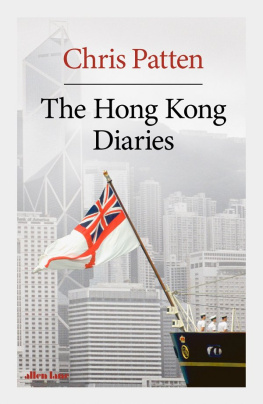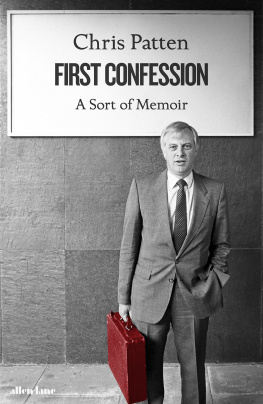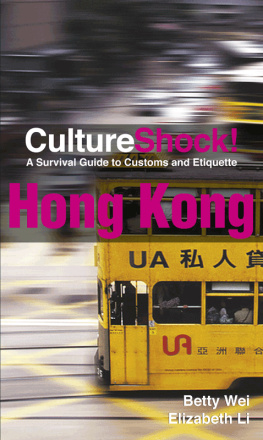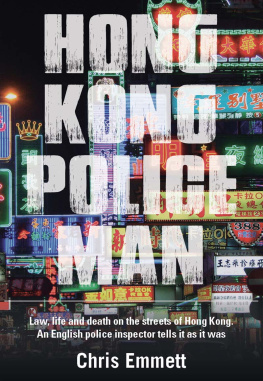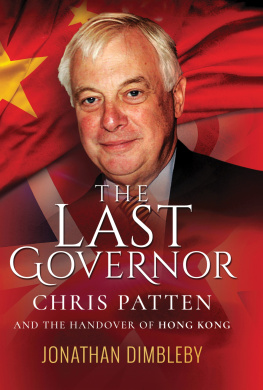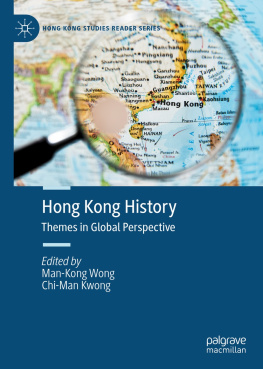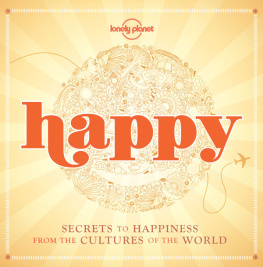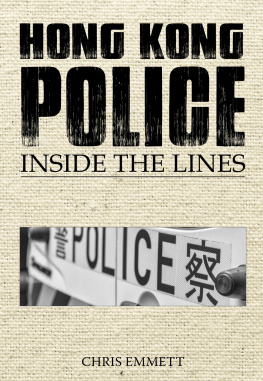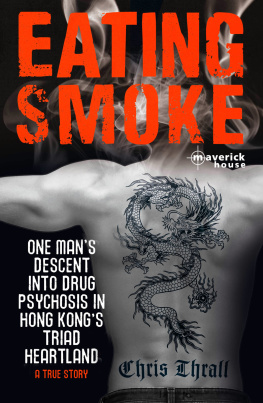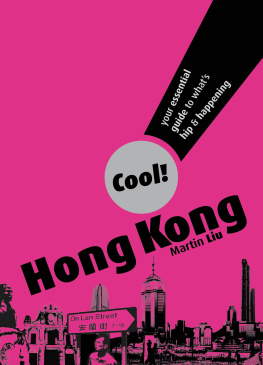Chris Patten - The Hong Kong Diaries
Here you can read online Chris Patten - The Hong Kong Diaries full text of the book (entire story) in english for free. Download pdf and epub, get meaning, cover and reviews about this ebook. year: 2022, publisher: Penguin Random House UK, genre: Detective and thriller. Description of the work, (preface) as well as reviews are available. Best literature library LitArk.com created for fans of good reading and offers a wide selection of genres:
Romance novel
Science fiction
Adventure
Detective
Science
History
Home and family
Prose
Art
Politics
Computer
Non-fiction
Religion
Business
Children
Humor
Choose a favorite category and find really read worthwhile books. Enjoy immersion in the world of imagination, feel the emotions of the characters or learn something new for yourself, make an fascinating discovery.
- Book:The Hong Kong Diaries
- Author:
- Publisher:Penguin Random House UK
- Genre:
- Year:2022
- Rating:3 / 5
- Favourites:Add to favourites
- Your mark:
- 60
- 1
- 2
- 3
- 4
- 5
The Hong Kong Diaries: summary, description and annotation
We offer to read an annotation, description, summary or preface (depends on what the author of the book "The Hong Kong Diaries" wrote himself). If you haven't found the necessary information about the book — write in the comments, we will try to find it.
The Hong Kong Diaries — read online for free the complete book (whole text) full work
Below is the text of the book, divided by pages. System saving the place of the last page read, allows you to conveniently read the book "The Hong Kong Diaries" online for free, without having to search again every time where you left off. Put a bookmark, and you can go to the page where you finished reading at any time.
Font size:
Interval:
Bookmark:


Chris Patten is Chancellor of Oxford University. When MP for Bath (1979-92) he served as Minister for Overseas Development, Secretary of State for the Environment and Chairman of the Conservative Party. He was Governor of Hong Kong from 1992 until 1997, Chairman for the Independent Commission on Policing after the Good Friday Agreement in 1998 and European Commissioner for External Relations from 1999 until 2004. The Observer has described him as the best Tory Prime Minister we never had.
First Confession: A Sort of Memoir
What Next?: Surviving the Twenty-First Century
Not Quite the Diplomat: Home Truths about World Affairs
East and West: The Last Governor of Hong Kong on Power, Freedom and the Future
To Lavender,
who gave up her career so that I could go to Hong Kong, who helped me hugely in my work as Governor, and who loved Hong Kong as much as I did.
Sadly, in the light of circumstances in Hong Kong today, I cannot in their own interest name many people in the city who have helped to keep me in touch with what has happened there, a story of broken promises and totalitarian vandalism. In London, I am particularly grateful to Hugh Davies and Charles Parton for their regular insights into what is happening in Hong Kong and in China as a whole. Johnny Patterson of Hong Kong Watch has helped to provide me with information and has checked some of my facts, and Ive also benefited from the ubiquitous advocacy of human rights of Ben Rogers, who helped to found this excellent organization.
My agent, Jim Gill, has been professionally helpful and supportive once again. Above all, I have benefited from the wisdom of Stuart Proffitt, the prince of editors, who makes me work hard despite my grumbles. At Penguin, Alice Skinner has been incredibly diligent and encouraging in moments when I have been sharing my study with the black dog. Alices sister, Lucy, came heroically to my aid at a difficult time to decipher and type my gnomic handwriting. Id also like to express my gratitude to Ania Gordon, Mark Handsley, Rebecca Lee, Emma Lubega and Pen Vogler. Twenty-five years ago, when my writing was bad but not quite as awful as it is today, the original diaries were typed up either from my manuscripts or from tapes by two former PAs, Dame Shirley Oxenbury and the Rev. Freda Evans; they did tremendous work.
All the members of my family as ever have been terrific. Kate and Alice have helped me to acquire some vague notion of how to use the technology on which I have been obliged to depend. Laura has cheered us all up and helped to keep everyone but me quite fit. Lavender has read every word of these diaries and has been available with advice 24 hours a day, seven days a week, as my technological and moral backup as I have shouted and raged at clouds, dragons, laptops, iPads and all the rest of this twenty-first-century stuff, which was very competently installed and humoured by Chris Edwards. Martin Dinham and Edward Llewellyn, who shared these years, have read a lot of the text of my edited diary, but any errors or solecisms are my responsibility alone.
Penny Rankin and Anna Alcraft have looked after what has been left of the rest of my life, public and private.
My most profound thanks go above all to those who worked with me in Hong Kong to try to protect and preserve what their city had been promised by a malevolent Communist Party. The people of Hong Kong were kind to me and my family; they made us welcome in their own homes; and I hope that one day they will be able to read these diaries and see how much their future mattered to so many of those of us who were given responsibility for them by events of an earlier age which no one today would seek to defend or condone.
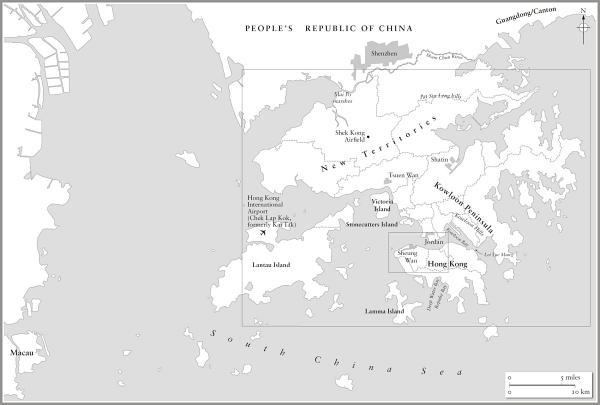
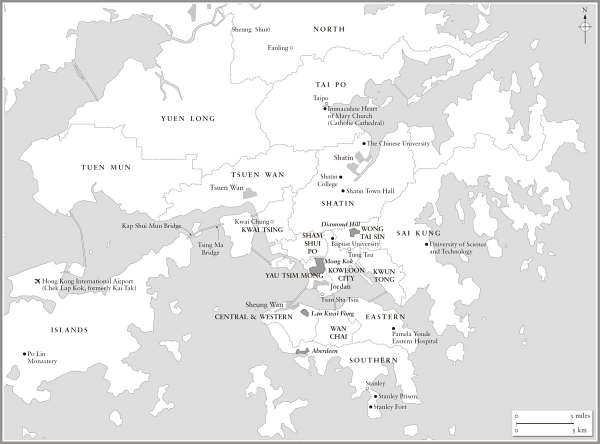
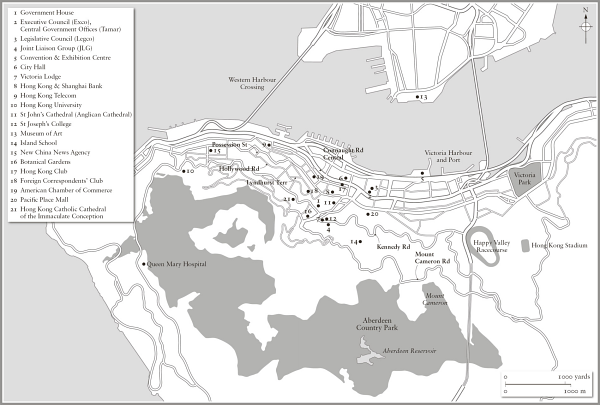
Every effort has been made to contact all copyright holders. The publisher will be pleased to amend in future printings any errors or omissions brought to their attention. Numbers refer to plates.
Mike Fiala / AFP / Getty Images).
Lee Kuan Yew and Chris Patten at the inaugural Li Ka Shing Distinguished Lecture at the University of Hong Kong, December 1992. SPH-ID: 18512000. (Photograph: Lianhe Zaobao).
Peter Ricketts and Michael Sze, 1993. Photograph reproduced by kind permission of Lord Ricketts GCMG GCVO.
1993. (Photograph: Martin Chan / South China Morning Post / Getty Images).
Fanling Lodge was built as a summer home for colonial governors in 1934 and is now used by the chief executive. (Photograph: South China Morning Post).
Morning Post / Getty Images).
Aerial view of Chek Lap Kok, 1996 (Photograph: Michael Yamashita).
Chinese President Mr Jiang Zemin (left) shaking hands with British Foreign Secretary Mr Malcolm Rifkind after their meeting in Beijing about the handover of Hong Kong to China on July 1, 1997. (Photograph:Taken on 8 Jan 1996, by South China Morning Post Staff Photographer).
All other photographs are from the collection of the author and the Patten family.
As one of Britains and Americas leading historians, Simon Schama, contends, History is an argument. The pity is that it is an argument that too often reflects attitudes and even prejudices already held rather than a balanced scrutiny of evidence and narrative. This is even more so when our interpretation of the past has critical significance for the present. The story of Hong Kong, where I spent five years as the last British Governor, has some bearing on a contemporary argument about Empire which carries the battle scars of preconceptions and facile generalizations. No one today (as I said in my farewell speech in Hong Kong on 30 June 1997) would seek to justify imperialism though even as I write these words, I think of the narrative that communist China weaves around its repressive rule in Xinjiang and Tibet. More relevant now is not whether we can justify colonial rule, applying contemporary values to past millennia, or even enumerate some of its benign consequences, but how and why empires have been assembled. Britains Empire is widely believed to have ended formally with our handover of the Hong Kong colony (or territory as we liked to call it, covering our embarrassment at the use of the other word) to China, a quarter of a century ago. What created it?
The 19th-century liberal historian and defender of imperialism Sir John Seeley famously remarked that the British Empire was acquired in a fit of absence of mind, mostly a result of mistakes, accidents and unintended consequences and the reactions to them. This was the opinion too of Jan Morris, who not only wrote a masterly history of Empire but also the best descriptive book on Hong Kong. Looking at the history of this colony, it certainly bears out her argument that imperial history was all bits and pieces. But the bits and pieces on the southern China shore, just south of the Tropic of Cancer and close to the Pearl River Delta, were very different to those that were assembled into Empire elsewhere.
Next pageFont size:
Interval:
Bookmark:
Similar books «The Hong Kong Diaries»
Look at similar books to The Hong Kong Diaries. We have selected literature similar in name and meaning in the hope of providing readers with more options to find new, interesting, not yet read works.
Discussion, reviews of the book The Hong Kong Diaries and just readers' own opinions. Leave your comments, write what you think about the work, its meaning or the main characters. Specify what exactly you liked and what you didn't like, and why you think so.

